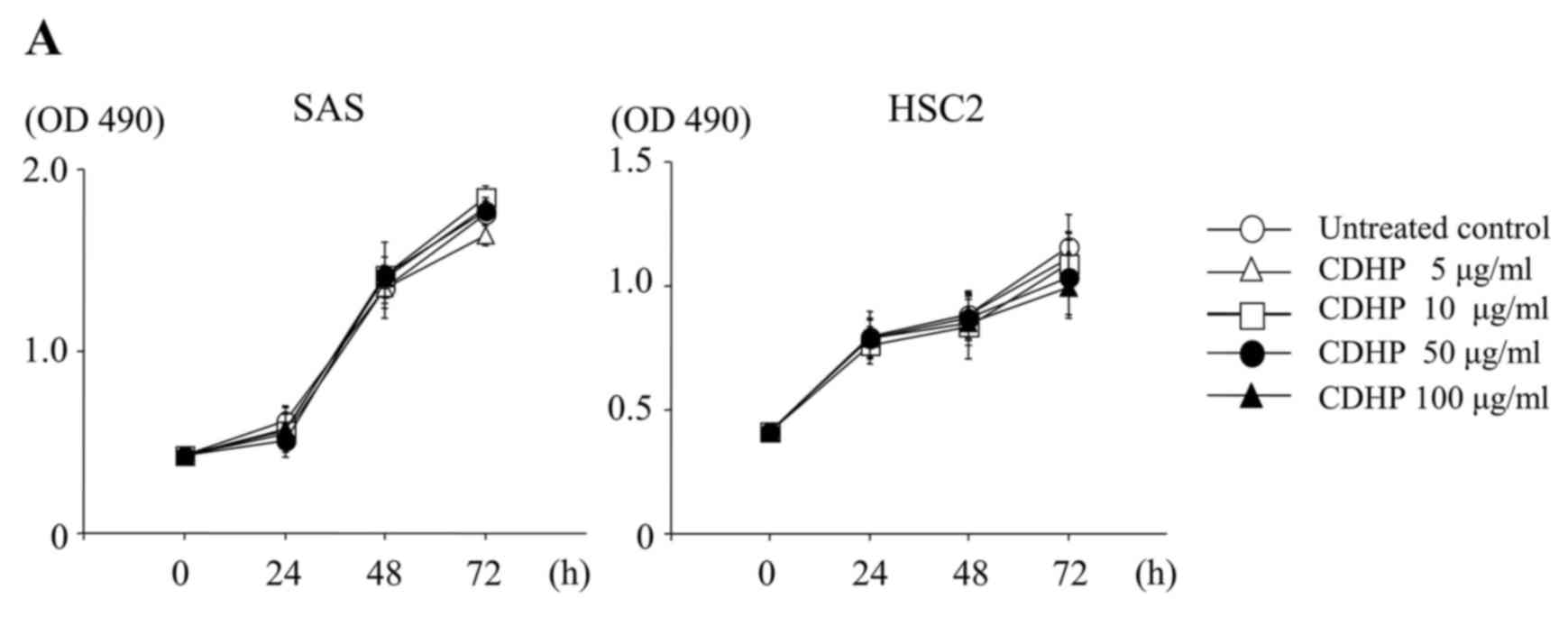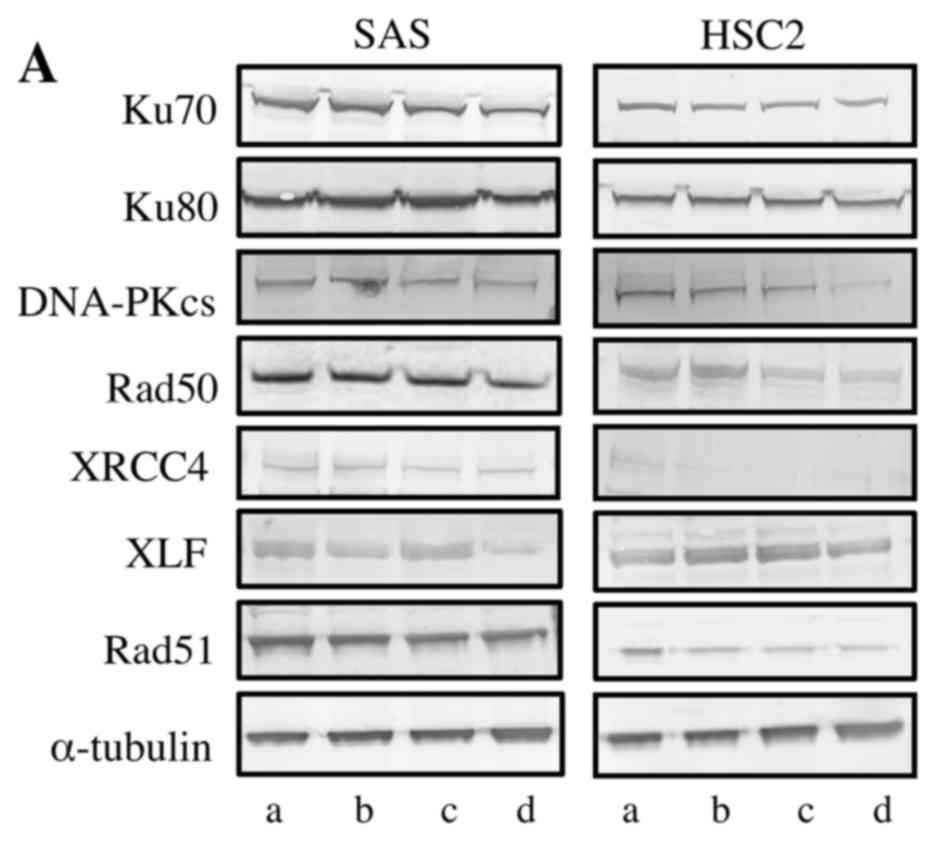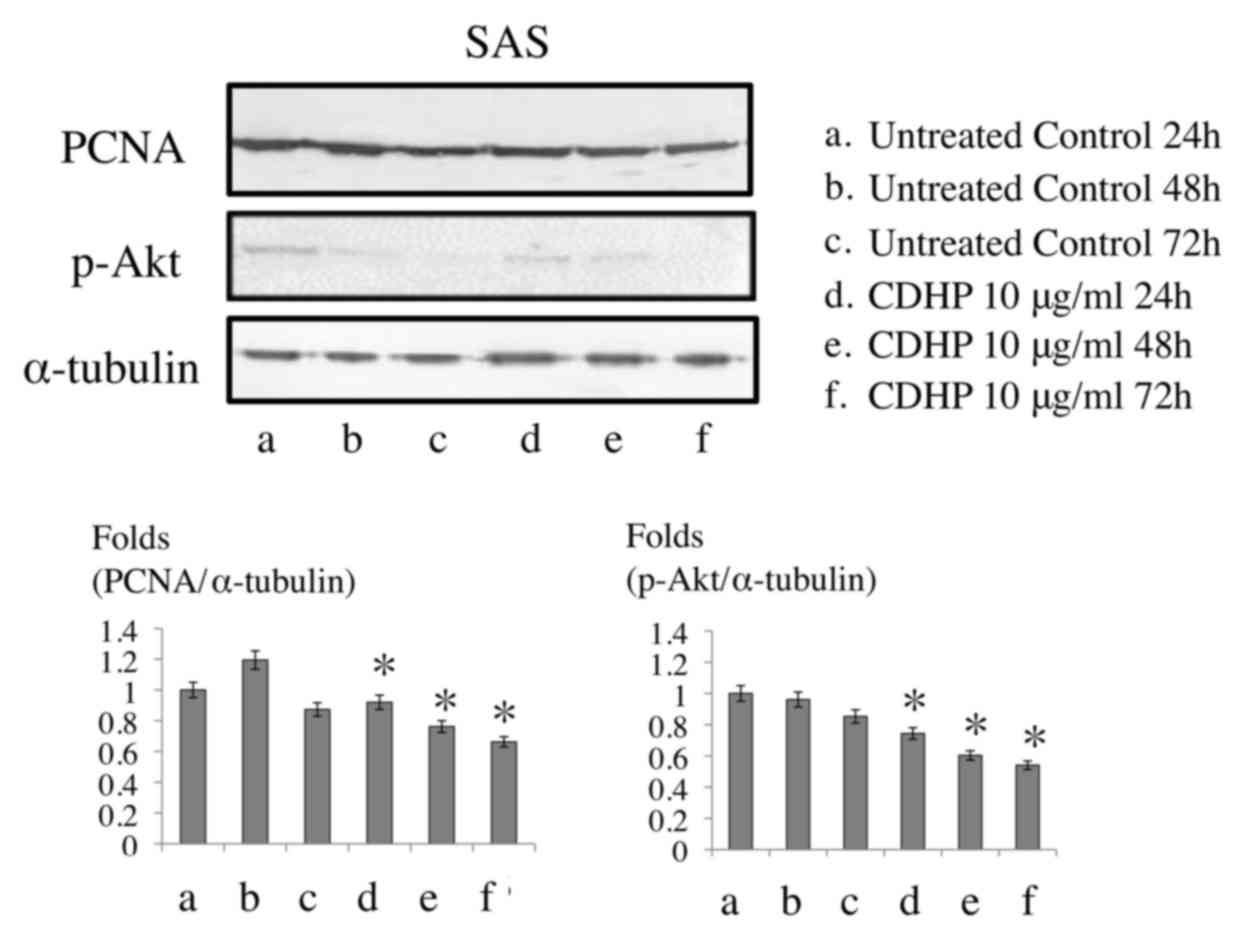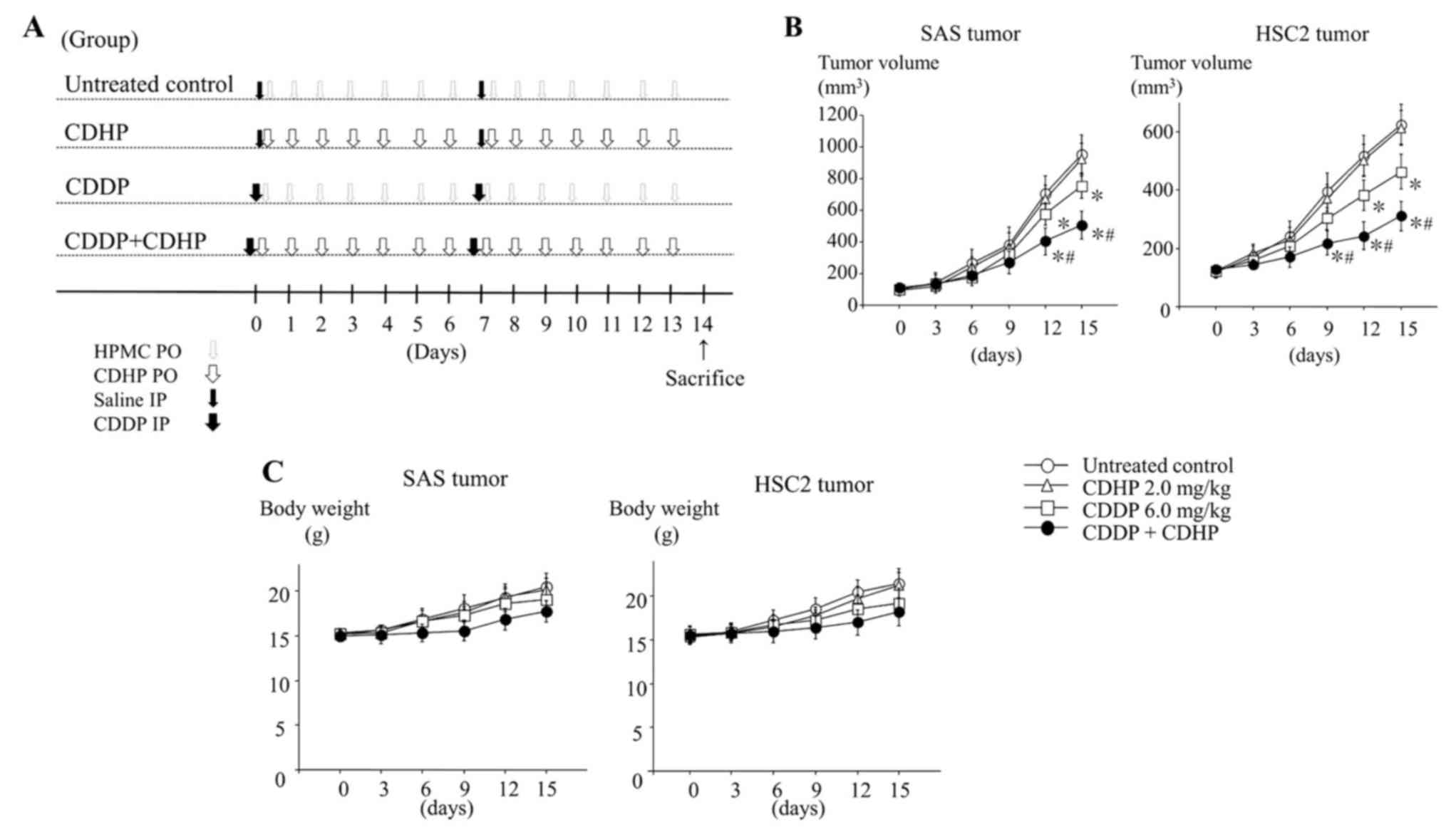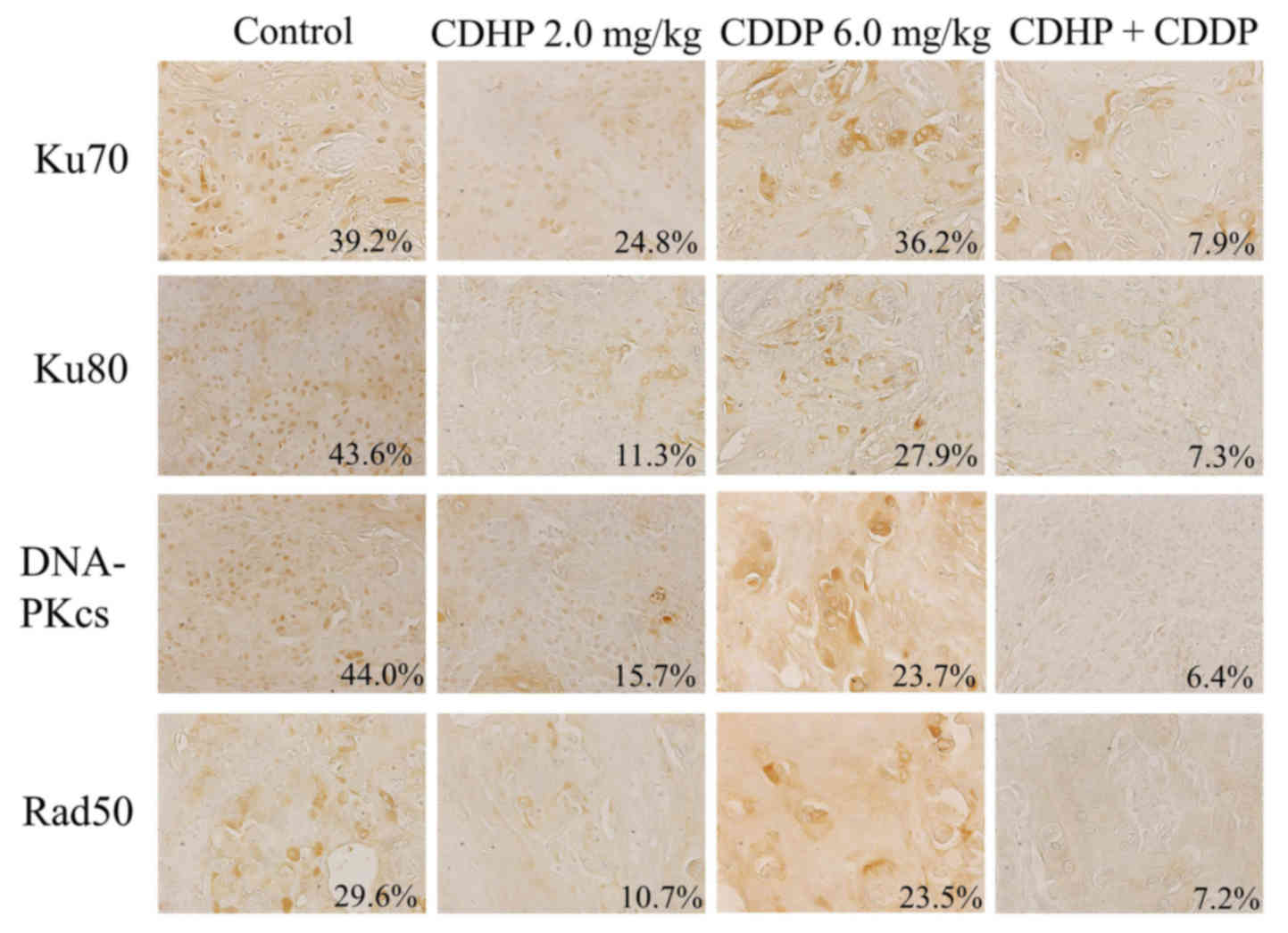|
1
|
Kish J, Drelichman A, Jacobs J, Hoschner
J, Kinzie J, Loh J, Weaver A and Al-Sarraf M: Clinical trial of
cisplatin and 5-FU infusion as initial treatment for advanced
squamous cell carcinoma of the head and neck. Cancer Treat Rep.
66:471–474. 1982.PubMed/NCBI
|
|
2
|
Fujii M, Tomita K, Nishijima W, Tsukuda M,
Hasegawa Y, Ishitoya J, Yamane H, Homma A and Tomita T: Phase I/II
Study of S-1 plus Cisplatin Combination Chemotherapy in Patients
with Advanced/Recurrent Head and Neck Cancer. Jpn J Clin Oncol.
40:214–221. 2010. View Article : Google Scholar : PubMed/NCBI
|
|
3
|
Fujii M: Combination therapy with S-1 and
CDDP for head and neck cancer. Gan To Kagaku Ryoho. 33:(Suppl 1).
S150–S154. 2006.(In Japanese).
|
|
4
|
Shirasaka T, Shimamoto Y, Ohshimo H,
Yamaguchi M, Kato T, Yonekura K and Fukushima M: Development of a
novel form of 5-fluorouracil derivative (S-1) directed to the
potentiation of the tumor selective cytotoxicity of 5-fluorouracil
by two biochemical modulators. Anticancer Drugs. 7:548–557. 1996.
View Article : Google Scholar : PubMed/NCBI
|
|
5
|
Shirasaka T, Nakano K, Takechi T, Satake
H, Uchida J, Fujioka A, Saito H, Okabe H, Oyama K, Takeda S, et al:
Antitumor effect of 1 M tegafur-0.4 M
5-chloro-2,4-dihydroxypyridine-1 M potassium oxonate (S-1) against
human colon carcinoma orthotopically implanted into nude rats.
Cancer Res. 56:2602–2606. 1996.PubMed/NCBI
|
|
6
|
Tatsumi K, Fukushima M, Shirasaka T and
Fujii S: Inhibitory effects of pyrimidine, barbituric acid and
pyridine derivatives on 5-fluorouracil degradation in rat liver
extract. Jpn J Cancer Res. 78:748–755. 1987.PubMed/NCBI
|
|
7
|
Inuyama Y, Kida A, Tsukuda M, Kohno N and
Satake B: S-1 Cooperative Study Group (Head and Neck Cancer Working
Group): Late phase II study of S-1 in patients with advanced head
and neck cancer. Gan To Kagaku Ryoho. 28:1381–1390. 2001.(In
Japanese). PubMed/NCBI
|
|
8
|
Harada K, Sato M, Ueyama Y, Nagayama M,
Hamakawa H, Nagahata S, Yoshimura Y, Osaki T and Ryoke K: Oral
Cancer Study Group of Chugoku-Shikoku: Multi-institutional phase II
trial of S-1 in patients with oral squamous cell carcinoma.
Anticancer Drugs. 19:85–90. 2008. View Article : Google Scholar : PubMed/NCBI
|
|
9
|
Asaumi Y, Miyanaga T, Hosokawa O, Nishida
Y, Matsunaga T, Shimizu S, Tanaka N, Ito T, Sato Y, Hirano Y, et
al: Effectiveness of postoperative adjuvant chemotherapy using S-1
plus CDDP for type 4 gastric cancer. Gan To Kagaku Ryoho.
40:323–325. 2013.(In Japanese). PubMed/NCBI
|
|
10
|
Rino Y, Murakami H, Yukawa N, Wada N,
Oshima T, Matsuura H, Sugano N, Arai H, Masuda M and Imada T:
Feasibility of S-1/CDDP therapy for outpatients with advanced
gastric cancer. Gan To Kagaku Ryoho. 36:1829–1831. 2009.(In
Japanese). PubMed/NCBI
|
|
11
|
Fujii M: Combination therapy with S-1 and
CDDP for head and neck cancer. Gan To Kagaku Ryoho. 33:(Suppl 1).
S150–S154. 2006.(In Japanese).
|
|
12
|
Uchida K, Hayashi K, Kuramochi H, Nakajima
G, Inoue Y and Yamamoto M: Combination therapy of S-1 and CDDP for
patients with colorectal cancer. J Cancer Res Clin Oncol.
133:841–846. 2007. View Article : Google Scholar : PubMed/NCBI
|
|
13
|
Fujii M, Sato H, Ogasawara T, Ando T,
Tsujii S, Nagahori J, Komatsu Y and Matsuoka A: A case of liver
metastasis of pancreatic acinar cell carcinoma treated with S-1 and
intra-arterial CDDP combination therapy. Gan To Kagaku Ryoho.
37:1987–1990. 2010.(In Japanese). PubMed/NCBI
|
|
14
|
Nishiyama M, Yamamoto W, Park JS, Okamoto
R, Hanaoka H, Takano H, Saito N, Matsukawa M, Shirasaka T and
Kurihara M: Low-dose cisplatin and 5-fluorouracil in combination
can repress increased gene expression of cellular resistance
determinants to themselves. Clin Cancer Res. 5:2620–2628.
1999.PubMed/NCBI
|
|
15
|
Scanlon KJ, Newman EM, Lu Y and Priest DG:
Biochemical basis for cisplatin and 5-fluorouracil synergism in
human ovarian carcinoma cells. Proc Natl Acad Sci USA.
83:8923–8925. 1986. View Article : Google Scholar : PubMed/NCBI
|
|
16
|
Takagi M, Sakata K, Someya M, Tauchi H,
Iijima K, Matsumoto Y, Torigoe T, Takahashi A, Hareyama M and
Fukushima M: Gimeracil sensitizes cells to radiation via inhibition
of homologous recombination. Radiother Oncol. 96:259–266. 2010.
View Article : Google Scholar : PubMed/NCBI
|
|
17
|
Sakata K, Someya M, Matsumoto Y, Tauchi H,
Kai M, Toyota M, Takagi M, Hareyama M and Fukushima M: Gimeracil,
an inhibitor of dihydropyrimidine dehydrogenase, inhibits the early
step in homologous recombination. Cancer Sci. 102:1712–1716. 2011.
View Article : Google Scholar : PubMed/NCBI
|
|
18
|
Harada K, Ferdous T and Ueyama Y:
Gimeracil exerts radiosensitizing effects on oral squamous cell
carcinoma cells in vitro and in vivo. Anticancer Res. 36:5923–5930.
2016. View Article : Google Scholar : PubMed/NCBI
|
|
19
|
Takagi M, Sakata K, Someya M, Matsumoto Y,
Tauchi H, Hareyama M and Fukushima M: The combination of
hyperthermia or chemotherapy with gimeracil for effective
radiosensitization. Strahlenther Onkol. 188:255–261. 2012.
View Article : Google Scholar : PubMed/NCBI
|
|
20
|
Rosenberg B: Possible mechanisms for the
antitumor activity of platinum coordination complexes. Cancer
Chemother Rep. 59:589–598. 1975.PubMed/NCBI
|















